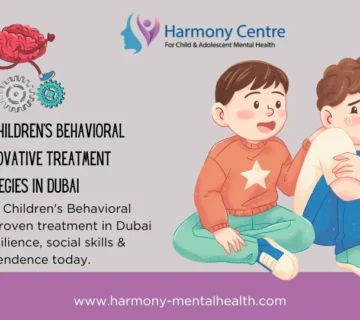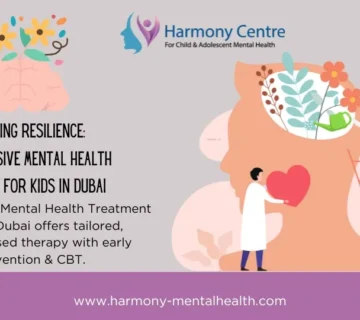Child Anger Management Dubai: Practical Strategies for Calmer Futures at Harmony Centre
Discover effective anger management strategies for children in Dubai at Harmony Centre. Our evidence‑based techniques help children regulate emotions and develop coping skills.
Contact Information
| Contact Method | Details |
|---|---|
| Phone | +971 (52) 8773268 / 04 558 2015 |
| Click Here | |
| info@harmony-mentalhealth.com | |
| Address | Office 409, Building Alrazi-64C, 26th St, Healthcare City, Dubai |
Introduction
In a fast‑paced city like Dubai, children may face a range of emotional challenges, including difficulty managing anger. Uncontrolled anger can disrupt learning, harm relationships, and affect overall well‑being. At Harmony Centre Mental Health Dubai, we understand that effective anger management is crucial for fostering emotional resilience and healthy social interactions. Our multidisciplinary team provides tailored, evidence‑based interventions to help children regulate their emotions, develop healthy coping skills, and build a more positive outlook for the future.
Learn More About Harmony Centre • Contact Us
Understanding Child Anger Management
What Is Child Anger Management?
Child anger management involves teaching children techniques and strategies to recognize, express, and control their anger in constructive ways. Unlike typical frustration, persistent anger that is unregulated can interfere with daily activities, relationships, and academic performance. Effective anger management empowers children to deal with conflicts and stress without resorting to aggressive or destructive behaviors.
Key Components of Anger Management
- Emotional Awareness:
Helping children recognize and understand their feelings. - Self-Regulation Techniques:
Teaching methods to calm the body and mind during moments of anger. - Problem-Solving Skills:
Equipping children with strategies to resolve conflicts and manage stress. - Positive Communication:
Encouraging the use of words rather than actions to express emotions. - Behavioral Reinforcement:
Using rewards and praise to encourage controlled, appropriate expressions of anger.
The Impact of Unmanaged Anger
Academic and Social Consequences
Uncontrolled anger can have significant consequences on a child’s life:
- Academic Disruptions:
Anger can hinder concentration, resulting in missed lessons and declining academic performance. - Social Isolation:
Frequent outbursts may lead to strained relationships with peers and teachers. - Emotional Strain:
Unaddressed anger can contribute to anxiety, depression, and low self‑esteem. - Family Conflict:
Persistent anger can create tension at home, affecting overall family dynamics.
Long‑Term Implications
If not managed effectively, anger can persist into adolescence and adulthood, affecting professional relationships, personal well‑being, and even leading to mental health disorders. Early intervention is essential to help children develop the skills they need to navigate challenges throughout life.
Our Approach at Harmony Centre
Comprehensive Behavioral Assessments
At Harmony Centre, we begin with a thorough assessment to understand the specific triggers and patterns of anger in your child. Our process involves:
Initial Consultation
- Family and Medical History:
We review your child’s developmental milestones, previous behavioral challenges, and any relevant family history. - Parental Observations:
Parents provide detailed insights into the circumstances that trigger anger and how it is expressed. - Preliminary Screening:
A brief evaluation identifies key areas for further investigation, such as impulse control and emotional regulation.
Standardized Testing and Observations
- Validated Assessment Tools:
We use scientifically‑validated instruments to measure emotional regulation, behavior patterns, and cognitive functions. - Direct Observations:
Therapists observe your child during structured tasks and in natural environments, such as during play or classroom activities. - Collaborative Feedback:
Input from educators and caregivers is integrated to provide a well‑rounded understanding of your child’s behavior.
Learn More About Our Assessment Process
Multidisciplinary Team Review
Integrated Analysis
Our multidisciplinary team—including child psychologists, psychiatrists, behavioral therapists, and educators—convenes to review all collected data. This collaborative effort ensures that every aspect of your child’s anger management challenges is addressed.
- Team Meetings:
Regular interdisciplinary meetings facilitate a comprehensive review of assessment results. - Diagnostic Profile:
We compile a detailed profile outlining your child’s strengths, triggers, and areas needing intervention. - Goal Setting:
Clear, measurable goals are established to guide the development of a personalized treatment plan.
Culturally Sensitive Considerations
- Multilingual Support:
Our services are provided in multiple languages to ensure clear communication. - Respect for Local Traditions:
Interventions are adapted to align with the cultural values of Dubai’s diverse community.
Personalized Treatment Planning
Based on comprehensive assessments, our team develops a tailored treatment plan designed to help your child manage anger effectively.
Individual Counseling Sessions
- Cognitive Behavioral Therapy (CBT):
CBT helps children identify and challenge negative thought patterns that contribute to anger, replacing them with positive strategies. - Mindfulness and Relaxation Techniques:
Guided mindfulness exercises and relaxation techniques, such as deep breathing and progressive muscle relaxation, help reduce physiological arousal during anger episodes. - Behavioral Therapy:
Techniques such as role-playing and social stories are used to practice alternative responses to anger-provoking situations.
Family Counseling
- Parental Workshops:
Our workshops equip parents with strategies to reinforce positive behavior and manage anger at home. - Family Therapy Sessions:
Involving the entire family in therapy helps address dynamics that may contribute to your child’s anger, promoting a supportive home environment. - Consistent Communication:
Regular feedback sessions ensure that strategies are consistently applied both at home and in therapy sessions.
Group Therapy and Social Skills Training
- Peer Interaction:
Group therapy sessions provide a safe space for children to practice social skills, learn conflict resolution techniques, and receive positive reinforcement from peers. - Structured Activities:
Collaborative activities and role‑playing exercises help children build empathy and understand the consequences of aggressive behavior.
Digital Tools and Resources for Continuous Support
Telehealth Services
- Virtual Consultations:
Our secure telehealth platform allows for ongoing support, enabling regular check-ins without the need for travel. - Digital Monitoring Tools:
Use mobile apps and online tools to track your child’s progress, set reminders for relaxation exercises, and monitor behavior trends. - Interactive Webinars:
Participate in online workshops that offer expert advice on managing anger and stress in children.
Explore Our Digital Resources
Get in Touch
Evidence-Based Outcomes and Success Stories
Quantitative Improvements
Our evidence‑based approach to anger management has led to significant measurable improvements:
- Reduction in Anger Outbursts:
Many children experience a 30–50% decrease in the frequency and intensity of anger episodes. - Improved Emotional Regulation:
Consistent therapy leads to better control over emotional responses, as evidenced by standardized assessments. - Enhanced Academic Performance:
Reduced behavioral disruptions correlate with improved concentration and academic engagement.
Qualitative Success
Real-life testimonials from families and educators underscore the transformative impact of our interventions:
“Since starting therapy at Harmony Centre, my son’s anger outbursts have decreased significantly. He now expresses his frustration in more constructive ways and his school performance has improved.”
– Parent Testimonial
“The group therapy sessions were incredibly beneficial. Our students learned how to manage their emotions and support each other, creating a more positive classroom environment.”
– Educator Testimonial
For more information on managing anger in children, refer to the American Academy of Child & Adolescent Psychiatry (external link).
Practical Strategies for Families, Educators, and the Community
For Families
Create a Structured Home Environment
- Establish Consistent Routines:
Use visual schedules to create predictable daily routines, reducing uncertainty and stress. - Designate a Calm Space:
Set up a quiet area where your child can practice relaxation techniques during moments of anger. - Engage in Joint Activities:
Participate in family activities such as sports, art projects, or nature walks to channel energy constructively.
Reinforce Therapeutic Techniques
- Daily Relaxation Practices:
Incorporate mindfulness exercises, deep breathing, and progressive muscle relaxation into your child’s daily routine. - Role-Playing Social Scenarios:
Practice common situations that trigger anger through role-playing, helping your child develop alternative responses. - Celebrate Improvements:
Acknowledge and reward progress, no matter how small, to build your child’s confidence and encourage continued effort.
For Educators
Integrate SEL Programs in the Classroom
- Implement Social-Emotional Learning (SEL):
Use curricula that teach emotional regulation, conflict resolution, and effective communication. - Create a Supportive Classroom Environment:
Designate quiet zones where students can take breaks and practice calming strategies. - Facilitate Group Activities:
Organize interactive group projects and role-playing exercises to encourage positive social interactions and peer support.
Collaborate with Parents and Therapists
- Regular Parent-Teacher Meetings:
Share observations and discuss strategies to support the child’s behavior both at home and in the classroom. - Leverage Digital Tools:
Use apps and online platforms to track student progress and provide consistent, constructive feedback. - Offer Positive Reinforcement:
Encourage and reward improvements, fostering an environment where students feel valued and supported.
For the Community
Engage in Public Awareness Initiatives
- Attend Workshops and Seminars:
Participate in community events focused on child mental health and anger management. - Join Support Groups:
Connect with local parent and educator groups to exchange experiences, strategies, and resources. - Advocate for Quality Mental Health Care:
Support initiatives that promote accessible, evidence‑based mental health services for children throughout Dubai.
Utilize Digital Resources
- Telehealth and Virtual Workshops:
Access our online resources, webinars, and telehealth services for expert advice and continuous support. - Educational Platforms:
Explore digital content that offers tips, interactive exercises, and video tutorials on managing anger and stress in children.
Explore Our Community Initiatives
Get in Touch
Frequently Asked Questions about Child Anger Management Dubai
Book a Consultation Now
Contact Information
Office Address:
Office 409, Building Alrazi-64C, 26th St, Umm Hurair 2, Dubai Healthcare City, Dubai
Phone:
+971 4 558 2015
+971 5 287 73268
Email:
info@harmony-mentalhealth.com
Final Thoughts about Child Anger Management Dubai
Effective anger management is essential for helping children navigate emotional challenges and build a foundation for positive future interactions. At Harmony Centre Mental Health Dubai, our comprehensive, evidence‑based approach provides the tools and support needed to reduce anger, foster emotional regulation, and promote resilience. Through a combination of individualized therapy, family involvement, and community engagement, we empower children to transform their anger into constructive energy.
Invest in your child’s future with expert anger management strategies from Harmony Centre—a trusted partner in nurturing calm, confident, and well‑adjusted young minds in Dubai.
Learn More About Harmony Centre
Get in Touch
👉 Book a Consultation Now: Call +971 4 558 2015 or visit www.harmony-mentalhealth.com.
Join our online community and stay updated with our latest events, articles about Child Anger Management Dubai



